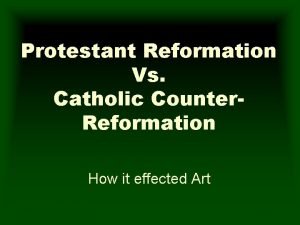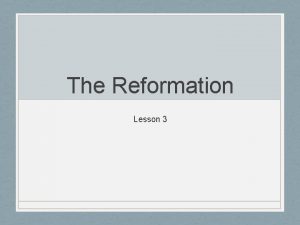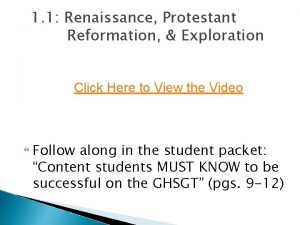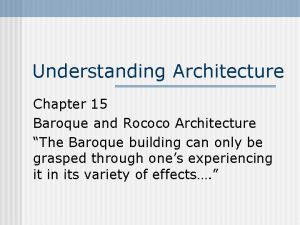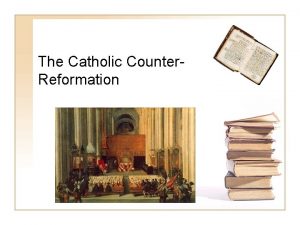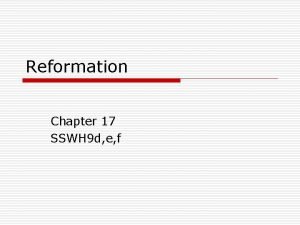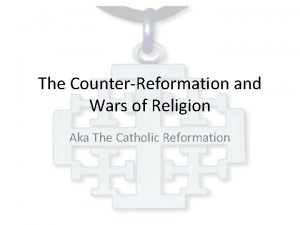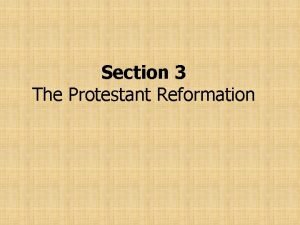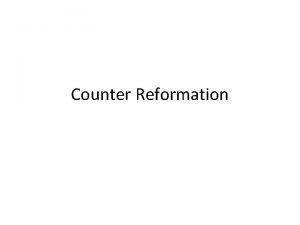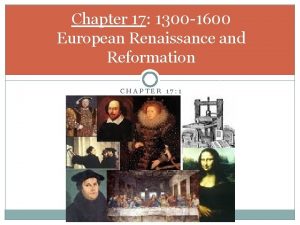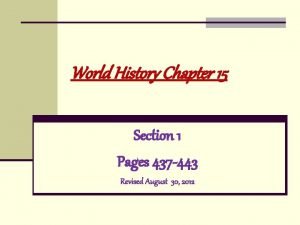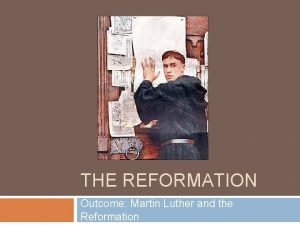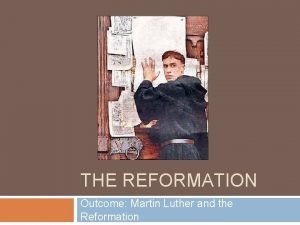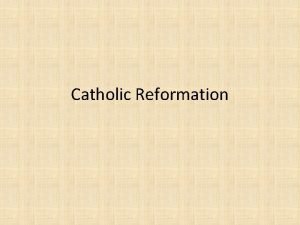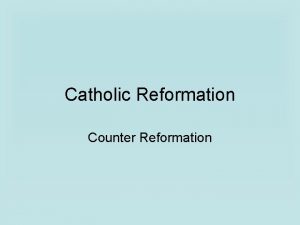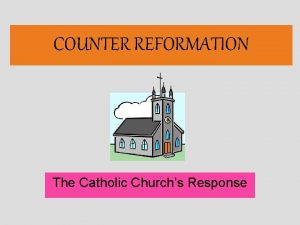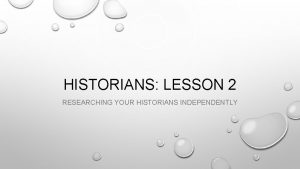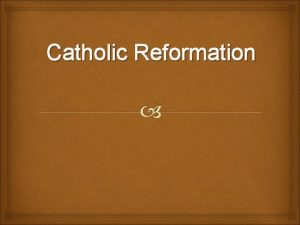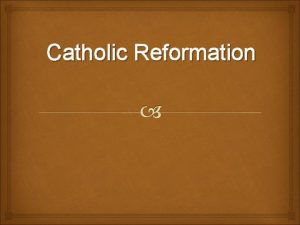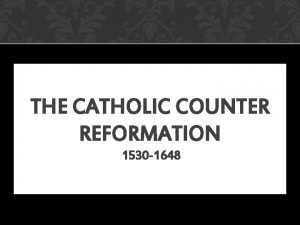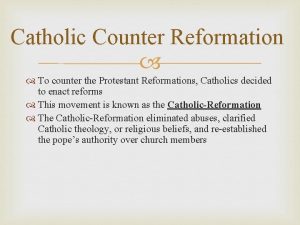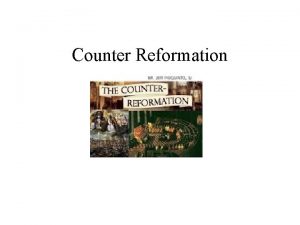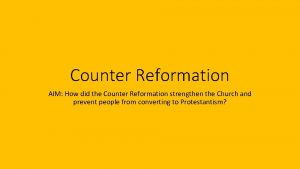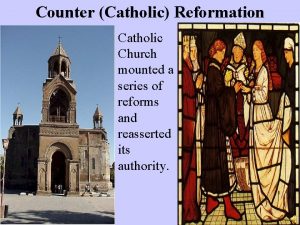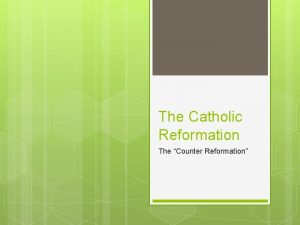Catholic Reformation Or Counter Reformation Reformation Historians disagree

















- Slides: 17

Catholic Reformation Or Counter Reformation

Reformation • Historians disagree on whether or not the Catholic Reformation was a counter Reformation to the Protestant Reformation of if it was started for sincere reasons. • Isabella inherited the crown of Castile in 1474 Ferdinand was already King of Sicily and would become King of Aragon • Isabella was passionate about reform

Ferdinand & Isabella • They petitioned Pope Alexander VI (Borgia) for the right to name high ecclesiastical posts and he let them • Ferdinand named his 6 year old son to one • Isabella was more reform oriented • She named Francisco Jimenez de Cisneros as confessor and eventually made him become archbishop

Isabella & Francisco • They set out to reform monasteries and convents • The Pope was not a reformer but allowed Isabella some leeway because he was political • These 2 were not tolerant especially from deviation of theology • He was the leading inquisitor

Protestantism • Protestantism gave another reason for the Catholic church to have a Reformation • Some catholic scholars devoted all their time to refute protestant beliefs

New Orders • Teresa of Avilia founded the Carmelites-Only woman in the history of the church to found male and female orders • Ignatius of Loyola founded the Jesuits (society of Jesus) • He wished to work among the Turks but was the main counter-offensive to Protestants

Pope’s • Throughout the 1520 -30’s the church did not seek reform • Politics is one issue-Charles V and Pope’s never could agree on a general assembly • Pope’s were worldly-Charles V attacked Pope Clement VII due to his alliance with France • Rome was ransacked and the pope taken prisoner

Pope’s • When Luther nailed his 95 thesis, Leo X was pope and he was concerned with helping the house of Medici • Paul III followed Clement VII and the ransacking of Rome woke him up some • He was still plagued by nepotism and illegitimate children

Pope Paul III • He did recognize the Jesuits • Appointed new Cardinals they were reform minded • In 1537 a report was issued by the Cardinals that said disorder in the church was directly related to the need for church reform

Council of Trent • In 1545, the church finally realized it needed a general council and Charles V insisted it be held in his territories so Trent was decided upon • The council had been agreed upon earlier but 2 wars between Charles and Francis delayed the event

Trent • The council decided to address every item the Protestant Reformation cited • Tensions grew between the pope and Charles so the pope moved the council to papal states but Charles kept his troops at Trent • The council was not competed until 1563 due to various delays in: 1547, 1551

Trent • Books published by Reformers or Reformers Bibles were banned and for a while in Spain the crime was punishable by death • Bishops had to reside where they served • Condemned pluralism of seats • Regulated relics and indulgences • Founding of seminaries for ministers • Declared Vulgate was authoritative

Trent • 7 Sacraments • Mass is true sacrifice and can be offered for the dead • Justification is based on good works through grace and the believer • This Council marked the beginning of the new Catholic Church

30 Years’ War • Peace of Augsburg said German Princes’ could determine the religion in their own territory but this would not last • In 1576, Rudolph II became Emperor and protestants did not trust him • In 1606 in Donauworth there were riots because the city had opted for Protestantism and bordered heavily Catholic Bavaria

30 Years’ War • Monks and Protestants had skirmishes and Duke Maximillian stamped this out with violence toward Protestants • Protestants formed the Evangelical Union and Catholics formed the Catholic League • Ferdinand was appointed King of Bohemia by Rudolph and was Catholic • Protestants threw 2 of the King’s officials out the window

30 Years’ War • Maximillian had success early on against the Protestants • Other countries feared the house of Hapsburg becoming too powerful • England, Netherlands, and Denmark joined in a Protestant League • This fighting goes on for 30 years

Peace of Westphalia • The war was Europe’s bloodiest until the 20 th Century • Ferdinand II died and his son was not as intolerant and other nations were tired of fighting • Anabaptist were still not recognized in the peace treaty • Nothing was solved and it was handled poorly
 Protestant reformation vs counter reformation
Protestant reformation vs counter reformation Why historians disagree
Why historians disagree The catholic reformation lesson 3
The catholic reformation lesson 3 Protestant vs catholic war
Protestant vs catholic war What was the counter-reformation?
What was the counter-reformation? What was the counter-reformation?
What was the counter-reformation? Was the counter reformation successful?
Was the counter reformation successful? Peace of augsburg def
Peace of augsburg def French wars of religion summary
French wars of religion summary A major goal of the counter reformation was to
A major goal of the counter reformation was to Counter reformation
Counter reformation What was the counter-reformation?
What was the counter-reformation? Chapter 15 section 2 world history
Chapter 15 section 2 world history The reformation outcome martin luther and the reformation
The reformation outcome martin luther and the reformation The reformation outcome martin luther and the reformation
The reformation outcome martin luther and the reformation Do you agree or disagree with the statement
Do you agree or disagree with the statement Eat meals that are nutritious agree or disagree
Eat meals that are nutritious agree or disagree Agree disagree line
Agree disagree line
